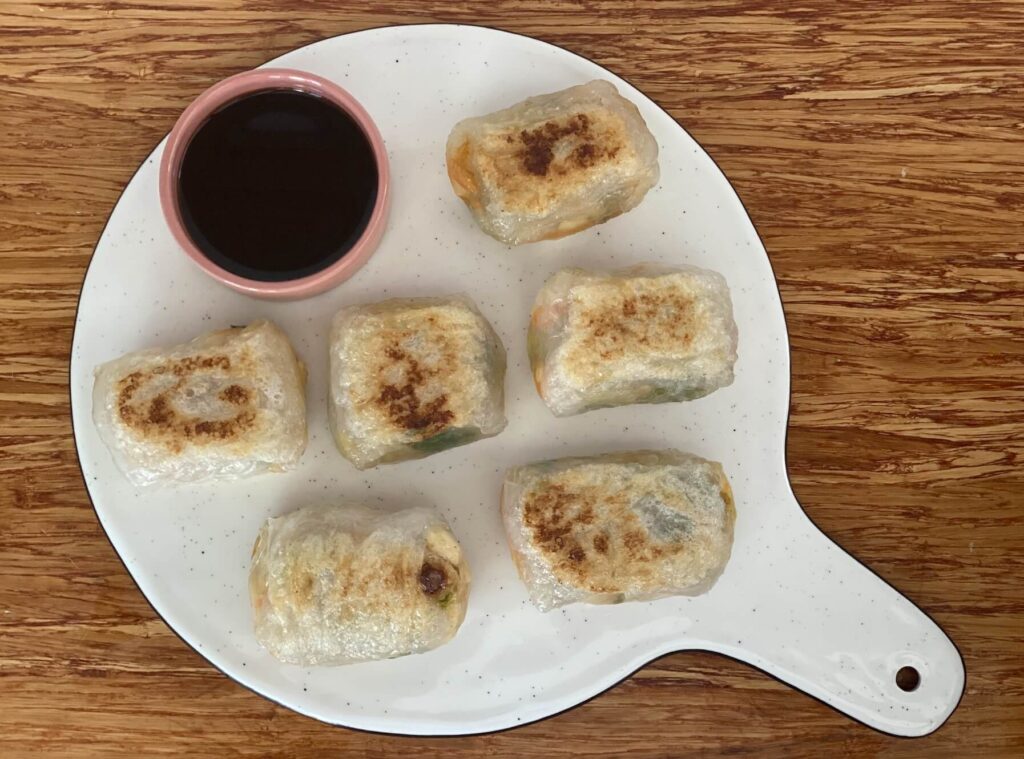Plan a cozy night in with a potluck and game night with friends this weekend.
These low FODMAP sticky Chinese chicken wings are the perfect appetiser to share with your friends. They are sticky and sweet and just a little bit spicy!
Sticky Chinese Chicken Wings
Serves: 5
Prep: 15 minutes
Cook: 45 minutes
Ingredients:
- Chicken wings, 42.3 oz
- 1 tsp sesame oil
- 1⅓ Tbsp rice wine vinegar
- 2½ Tbsp brown sugar
- 4 Tbsp soy sauce
- ¼ cup tomato paste
- 2 Tbsp oyster sauce
- 1⅓ Tbsp garlic-infused olive oil
- ½ tsp Chinese five spice
- 2½ Tbsp spring onion, green tips only
- 2 tsp sesame seeds, toasted
- 1⅓ Tbsp fresh coriander
- ½ mild red chilli (deseeded & finely sliced)
Method:
- Preheat the oven to 180ºC/350ºF.
- Place the chicken wings in a large bowl. Mix the sesame oil, rice wine vinegar, brown sugar, soy sauce, tomato paste, oyster sauce, garlic infused oil and Chinese five spice in a small bowl. Pour the marinade over the chicken wings and mix through. Allow to marinate for 10 minutes.
- Line a roasting tray with baking paper or grease well. Pull the chicken wings out of the marinade and place in the roasting tray. Reserve the left over marinade for basting.
- Place the chicken wings in the oven. Baste after 15 minutes with half of the left over marinade, then pour the rest of the marinade over the chicken at 30 minutes.
- Bake for 40 to 50 minutes until the meat is tender, and the wings are sticky and a gorgeous dark red/golden colour.
- Toast sesame seeds in a small frypan over medium-high heat for 1 to 2 minutes (no oil needed). Remove as they start to turn golden brown. Finely chop the green spring onion tips, red chilli, and fresh coriander.
- Serve with a sprinkle of sesame seeds, some roughly chopped fresh coriander, finely chopped spring onion tips, and some rings of fresh chilli.
Hints:
Make sure that your oyster sauce and Chinese five spice do not include onion or garlic.
Gluten-free option: If you have Coeliac disease and need to be trace gluten-free, then make sure your soy sauce, oyster sauce, and Chinese five spice are gluten-free. If you are just on the low FODMAP diet then you don’t need to worry about this.
Try our delicious crispy, chewy parcels of goodness! These rice paper dumplings are easy to make and taste fantastic!
Rice Paper Dumplings

Serves: 1 (6 dumplings)
Prep: 15 minutes
Cook: 5 minutes
Ingredients:
- Firm tofu, cut into small cubes, 2.82 oz
- Chinese cabbage (wombok), shredded, 2.64 oz
- 1/2 carrot, grated
- Oyster mushrooms, finely chopped, 2.64 oz
- Spring onion, green tops only, 0.35 oz
- 1/2 tbsp sesame oil
- 1/2 tbsp soy sauce
- 1/2 tbsp minced ginger
- 12 rice paper rounds
- Vegetable oil for cooking
- Soy sauce and rice wine vinegar to serve
Method:
- Add the prepared tofu and vegetables into a bowl and stir to combine.
- Add the soy sauce, sesame oil and ginger and stir
- Heat a fry pan over medium heat and add filling, cook, stirring for 5 mins until wilted down
- Prepare a plate with warm water and soak the rice paper round for 10 seconds or until soft. Place on a a board and spoon two tbsp of filling into the centre. Fold bringing the top flap down, then the right and left side towards the centre and bring the bottom flap upwards to seal. Repeat this process with a second rice paper round to make two layers to ensure it doesn’t break while cooking
- Repeat with remaining rice paper and filling to make 6 dumplings
- Over medium high heat, add enough oil to the fry pan to coat the bottom. Cook on each side until golden (about 3 minutes each) and crispy. Move to paper towel once cooked to drain excess oil. Serve with soy sauce and rice wine vinegar





